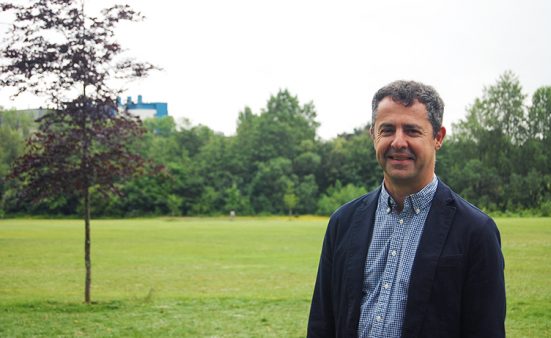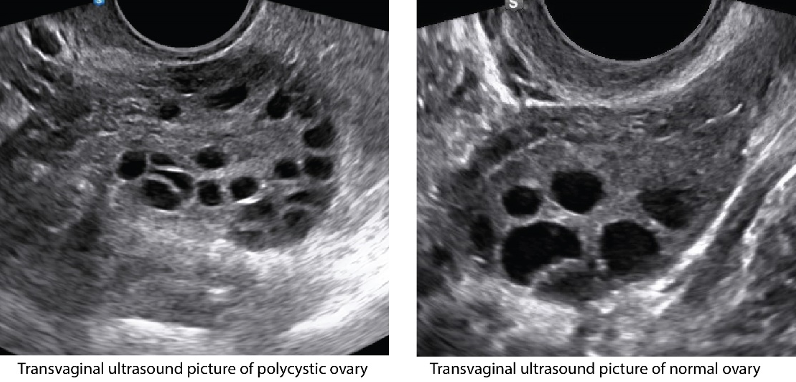Polycystic ovary syndrome and the importance of endocrine research
16 February 2022
Professor Aled Rees (MBBCh 1993, PhD 2002) has dedicated his life to endocrinology – one of the lesser-known areas of research that impacts us all. Here he explains what endocrinology is, why it’s important, and how his research looks at the long-term health conditions associated with polycystic ovary syndrome.
Professor Aled Rees grew up in Pembrokeshire and travelled a little further afield to Cardiff, to study medicine. He was drawn to the University thanks to the strong international reputation of its work into pituitary disease/endocrinology. Since completing his studies, he has worked as both a clinician and a researcher in Cardiff, splitting his work between the NHS and the University.
Explaining endocrinology
Many people don’t know what endocrinology is, and Aled has an excellent explanation for when he (inevitably) gets asked this question.
“Imagine that your hormones are an orchestra – the thyroid hormones, steroid hormones, testosterone and so on. The pituitary gland is the size of pea at the base of the brain behind the nose. This is the conductor in charge of the orchestra. The conductor gets feedback from the orchestra/hormones and they keep each other in balance.”
Hormones control many aspects of regulation in the body, like your metabolism, weight, blood pressure, testosterone production etc. A deficiency or excess of hormones will impact the way these things work. Diabetes, hypothyroidism (under active thyroid) and polycystic ovary syndrome (PCOS) are better-known examples of endocrine disorders. But there’s a wide spectrum of endocrine abnormalities and conditions.
PCOS and long-term health conditions
Much of Aled’s work focuses on neuroendocrinology, how endocrine disorders effect the brain. This includes studying polycystic ovary syndrome (PCOS), which is the most common hormonal disorder in young women, effecting 5-10% of the premenopausal population. It’s a condition characterised by reduced response to insulin, as well as hyperandrogenism and abnormal ovarian morphology.
Part of Aled’s research involves discovering if this translates to other health risks, such as diabetes and cardiovascular disease. This involves analysing large amounts of data, looking at things like patient demographics, recorded diagnosis, prescriptions etc. It also involves brain imaging, which is one of the strengths in research at Cardiff University because of the Cardiff University Brain Research Imaging Centre (CUBRIC).
“We’ve been able to demonstrate the need for more awareness around increased long-term risk of diabetes, cardiovascular disease and even strokes. It’s imperative that maintenance of healthy weight and prevention of these problems is brought into treatment at an early stage.”
In terms of treatment, Aled and his team conducted a gold-standard trial: a randomised, double blind, placebo-controlled crossover trial of the effects of a drug called metformin on vascular and metabolic risk in young women with PCOS. So far, the findings suggest that this drug may hold promise in reducing the risk of cardiovascular and metabolic disease, but more research is needed.
Mental health and neurodevelopmental outcomes
“PCOS is an under recognised and underappreciated condition, which has a very significant impact on the lives of the women effected.”
Skin manifestations such as hair loss and acne can be very emotionally distressing, as well as concerns about fertility and other issues, and this might contribute to increased rates of a diagnosis of depression and anxiety in those with PCOS.
Other studies have been conducted to observe neurodevelopmental outcomes, particularly autism and ADHD, for children born to mothers with PCOS. Early findings indicate that the relative risk increases with PCOS pregnancies, but the actual risk (the number of people affected) is very low in the general population. The relative increase could be a result of androgen, or testosterone levels, which tend to be higher in PCOS pregnancies, or it could be shared familial factors.
Aled presents this research in our Research Showcase event, going into more detail and stressing the need “for further research to understand the mechanisms involved in order to optimise interventions and reduce cardiovascular, metabolic and psychiatric morbidity linked to PCOS.”
Plans for the future
Aled is animated about what the future of neuroendocrinology holds. “It’s really exciting to be able to work with colleagues from other disciplines who come from all kinds of backgrounds. It’s going to be a really exciting time for us because of the unprecedented resource and opportunity in Cardiff.”
“We have plans to redesign services in Wales to support a more formal commissioning process for how we deliver our work and concentrate on the rarer conditions that we deal with. I’d like to see our data inform policy, as that’s a really impactful thing we can do to understand risk and concentrate resource.”
Generosity of others
“I can’t express my thanks enough for the wonderful donations that have been given to this research, especially a recent gift left in a Will. It’s a real honour to receive and it’s a fantastic opportunity to do some work that will be impactful and of immediate relevance for patients.
Donations are critical to research, even if it only leads to small changes, because this ultimately leads to bigger change.”
Find out more about how you can support research like Aled’s.
- January 2026
- November 2025
- September 2025
- July 2025
- June 2025
- May 2025
- April 2025
- March 2025
- February 2025
- January 2025
- October 2024
- September 2024
- August 2024
- July 2024
- June 2024
- May 2024
- April 2024
- March 2024
- February 2024
- January 2024
- December 2023
- November 2023
- October 2023
- September 2023
- August 2023
- July 2023
- June 2023
- May 2023
- April 2023
- March 2023
- February 2023
- January 2023
- November 2022
- October 2022
- September 2022
- August 2022
- July 2022
- June 2022
- May 2022
- April 2022
- March 2022
- February 2022
- January 2022
- December 2021
- November 2021
- October 2021
- September 2021
- August 2021
- July 2021
- June 2021
- May 2021
- April 2021
- March 2021
- February 2021
- January 2021
- December 2020
- November 2020
- October 2020
- September 2020
- August 2020
- July 2020
- June 2020
- May 2020
- April 2020
- March 2020
- January 2020
- December 2019
- November 2019
- October 2019
- September 2019
- August 2019
- July 2019
- May 2019
- April 2019
- March 2019
- February 2019
- January 2019
- December 2018
- November 2018
- October 2018
- September 2018
- August 2018
- July 2018
- June 2018
- May 2018
- April 2018
- March 2018
- February 2018
- December 2017
- November 2017
- October 2017
- September 2017
- August 2017
- July 2017
- June 2017
- May 2017
- April 2017
- March 2017
- February 2017
- January 2017
- November 2016
- October 2016
- September 2016
- July 2016
- June 2016
- May 2016
- April 2016
- March 2016
- February 2016
- January 2016
- December 2015
- November 2015
- October 2015
- September 2015
- August 2015
- January 2015
- December 2014
- November 2014
- September 2014
- August 2014
- May 2014
